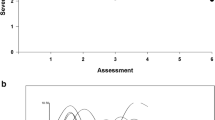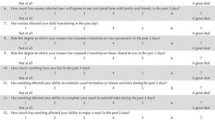Abstract
Goals of work
The present study sought to determine the prevalence of acute and delayed chemotherapy-induced nausea and vomiting (CINV) across ten community oncology settings. The effect of CINV on quality of life (QOL) was also evaluated.
Materials and methods
Cancer patients who were scheduled for their first cycle of a new chemotherapy regimen were recruited from ten community oncology clinics. Study participants recorded occurrence of CINV by completing a daily diary each day for the first 8 days after treatment during each cycle and the Functional Living Index-Emesis (FLIE) before chemotherapy, at the end of day 1 and day 6 after chemotherapy. Mixed model regression analysis was used to explore the association between occurrence of CINV at cycle 1 and subsequent cycles and its impact on patient QOL.
Main results
One hundred and fifty-one patients provided information for at least one cycle. During cycle 1, only 33% had neither acute nor delayed CINV. Of the 36% patients who developed acute CINV, 8% developed acute CINV only. Of the 59% who developed delayed CINV, 53% reported delayed only and 47% reported acute and delayed CINV. A similar pattern was seen at cycles 2 and 3. Experience of CINV at cycle 1 was associated with the development of CINV at cycles 2 and 3. Occurrence of CINV significantly interfered with patient QOL as assessed by the FLIE.
Conclusions
CINV remained a substantial problem for patients receiving chemotherapy in this community-based sample, especially delayed CINV. CINV significantly interfered with patient QOL and daily functioning.
Similar content being viewed by others
References
Blower PR (1990) The role of specific 5-HT3 receptor antagonism in the control of cytostatic drug-induced emesis. Eur J Cancer 26(Suppl 1):S8–S11
De Mulder PH, Seynaeve C, Vermorken JB, van Liessum PA, Mols-Jevdevic S, Allman EL, Beranek P, Verweij J (1990) Ondansetron compared with high-dose metoclopramide in prophylaxis of acute and delayed cisplatin-induced nausea and vomiting. A multicenter, randomized, double-blind, crossover study. Ann Intern Med 113:834–840
Dibble SL, Isreal J, Nussey B, Casey K, Luce J (2003) Delayed chemotherapy-induced nausea in women treated for breast cancer. Oncol Nurs Forum 30:E40–E47
Gandara DR (1991) Progress in the control of acute and delayed emesis induced by cisplatin. Eur J Cancer 27(suppl):9–11
Gandara DR, Harvey WH, Monaghan GG, Perez EA, Stokes C, Bryson JC, Finn AL, Hesketh PJ (1992) The delayed-emesis syndrome from cisplatin: phase III evaluation of ondansetron versus placebo. Semin Oncol 19:67–71
Gralla RJ, Osoba D, Kris MG, Kirkbride P, Hesketh PJ, Clark-Snow R, Gill DP, Groshen S, Grunberg S, Koeller JM, Morrow GR, Perez EA, Silber JH, Pfister DG (2000) Recommendations for the use of antiemetics: evidence-based, clinical practice guidelines. American Society of Clinical Oncology. J Clin Oncol 17(9):2971–2994
Griffin AM, Butow PN, Coates AS, Childs AM, Ellis PM, Dunn SM, Tattersall MH (1996) On the receiving end. V. Patient perceptions of the side effects of cancer chemotherapy in 1993. Ann Oncol 7:189–195
Grunberg SM, Deuson RR, Mavros P, Geling O, Hansen M, Cruciani G, Daniele B, De Pouvourville G, Rubenstein EB, Daugaard G (2004) Incidence of chemotherapy-induced nausea and emesis after modern antiemetics. Cancer 100:2261–2268
Harman GS, Omura GA, Ryan K, Hainsworth JD, Cramer MB, Hahne WF (1996) A randomized, double-blind comparison of single-dose and divided multiple-dose dolasetron for cisplatin-induced emesis. Cancer Chemother Pharmacol 38:323–328
Hesketh PJ, Harvey WH, Harker WG, Beck TM, Ryan T, Bricker LJ, Kish JA, Murphy WK, Hainsworth JD, Haley B (1994) A randomized, double-blind comparison of intravenous ondansetron alone and in combination with intravenous dexamethasone in the prevention of high-dose cisplatin-induced emesis. J Clin Oncol 12:596–600
Hesketh PJ, Kris MG, Grunberg SM, Beck T, Hainsworth JD, Harker G, Aapro MS, Gandara D, Lindley CM (1997) Proposal for classifying the acute emetogenicity of cancer chemotherapy. J Clin Oncol 15:103–109
Hickok JT, Roscoe JA, Morrow GR, King DK, Atkins JN, Fitch TR (2003) Nausea and emesis remain significant problems of chemotherapy despite prophylaxis with 5-hydroxytryptamine-3 antiemetics: a University of Rochester James P. Wilmot Cancer Center Community Clinical Oncology Program Study of 360 cancer patients treated in the community. Cancer 97:2880–2886
International (Perugia) Consensus on Antiemetic Therapy (1988) Antiemetic Subcommittee of the Multinational Association of Supportive Care in Cancer. Support Care Cancer 6:197–261
Italian Group for Antiemetic Research (1994) Cisplatin-induced delayed emesis: pattern and prognostic factors during three subsequent cycles. Ann Oncol 5:585–589
Kris MG, Gralla RJ, Clark RA, Tyson LB, O’Connell JP, Wertheim MS, Kelsen DP (1985) Incidence, course, and severity of delayed nausea and vomiting following the administration of high-dose cisplatin. J Clin Oncol 3:1379–1384
Kris MG, Tyson LB, Clark RA, Gralla RJ (1992) Oral ondansetron for the control of delayed emesis after cisplatin. Report of a phase II study and a review of completed trials to manage delayed emesis. Cancer 70:1012–1016
Lindley CM, Bernard S, Fields SM (1989) Incidence and duration of chemotherapy-induced nausea and vomiting in the outpatient oncology population. J Clin Oncol 7:1142–1149
Martin AR, Pearson J, Cai B, Elmer M, Horgan K, Lindley C (2000) Validation of a 5-day recall version of the Functional Living Index-Emesis (FLIE) quality of life questionnaire for chemotherapy-induced emesis. Qual Life Res 9(3):P-18
Marty M, Pouillart P, Scholl S, Droz JP, Azab M, Brion N, Pujade-Lauraine E, Paule B, Paes D, Bons J (1990) Comparison of the 5-hydroxytryptamine 3 (serotonin) antagonist ondansetron (GR 38032F) with high-dose metoclopramide in the control of cisplatin-induced emesis. N Engl J Med 322:816–821
Mason BA, Dambra J, Grossman B, Catalano RB (1982) Effective control of cisplatin-induced nausea using high-dose steroids and droperidol. Cancer Treat Rep 66:243–245
Moreno I, Rosell R, Abad A, Barnadas A, Carles J, Ribelles N, Solano V, Font A (1992) Comparison of three protracted antiemetic regimens for the control of delayed emesis in cisplatin-treated patients. Eur J Cancer 28A:1344–1347
Morrow GR, Hickok JT, Burish TG, Rosenthal SN (1996) Frequency and clinical implications of delayed nausea and delayed emesis. Am J Clin Oncol 19:199–203
No authors listed (1997) NCCN antiemesis practice guidelines. Oncology (Williston Park) 11:57–89
Osoba D, Zee B, Pater J, Warr D, Latreille J, Kaizer L (1997) Determinants of postchemotherapy nausea and vomiting in patients with cancer. Quality of Life and Symptom Control Committees of the National Cancer Institute of Canada Clinical Trials Group. J Clin Oncol 15:116–123
Roila F, Boschetti E, Tonato M, Basurto C, Bracarda S, Picciafuoco M, Patoia L, Santi E, Penza O, Ballatori E et al (1991) Predictive factors of delayed emesis in cisplatin-treated patients and antiemetic activity and tolerability of metoclopramide or dexamethasone. A randomized single-blind study. Am J Clin Oncol 14:238–242
Schipper H, Clinch J, McMurray A, Levitt M (1984) Measuring the quality of life of cancer patients: the Functional Living Index-Cancer: development and validation. J Clin Oncol 2:472–483
Voliotis DL, Diehl V (1998) Clinical aspects and prognostic factors of nausea and vomiting after chemotherapy. In: DiCato MA (ed) Medical management of cancer treatment induced emesis. Martin Dunitz, Philadelphia, pp 45–54
Acknowledgement
This research was supported by a grant from Merck & Co., Inc.
Author information
Authors and Affiliations
Corresponding author
Additional information
Work performed at California Cancer Care, CA
Henry Hu and Eileen E. Ming were employed by Merck & Co., Inc. during this study. L. Cohen and Carl A. de Moor were consultants with Merck & Co., Inc. during this study.
Rights and permissions
About this article
Cite this article
Cohen, L., de Moor, C.A., Eisenberg, P. et al. Chemotherapy-induced nausea and vomiting—incidence and impact on patient quality of life at community oncology settings. Support Care Cancer 15, 497–503 (2007). https://doi.org/10.1007/s00520-006-0173-z
Received:
Accepted:
Published:
Issue Date:
DOI: https://doi.org/10.1007/s00520-006-0173-z




